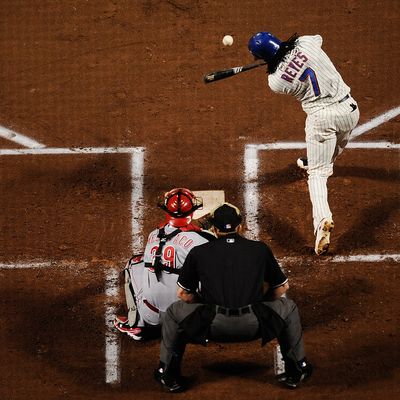
The opinion issued Tuesday by Southern District* Court Judge Jed S. Rakoff in the case between the trustee for Bernie Madoff’s victims and the owners of the New York Mets indisputably contained plenty of good news for the latter. Rakoff significantly limited the total amount Picard can seek from the Mets—down from $1 billion to $386 million—while raising the standard of proof that trustee Irving Picard needs to meet to recover even that much. It’s a good day to be a Wilpon—but not necessarily a good one to be a Mets fan, because even after the favorable ruling the team probably won’t have enough money to re-sign Jose Reyes.
The shortstop was pulled after one at-bat Wednesday afternoon, ending his season with a .337 batting average. His near-term future involves free agency; the Mets ownership group’s near-term future involves a mountain of financial obligations.
Consider that the minimum amount the Met owners would be on the hook for, as per Rakoff’s decision, is approximately $83 million. (That minimum could increase on appeal to $295 million.) But with a March trial date looming, the Mets need to prepare to pay out that sum, while also paying out an estimated $30–40 million in legal fees between now and the the end of a trial. Meanwhile, the better result they get at trial, the likelier the trustee is to appeal, driving up the owners’ near-term legal costs even further.
Then consider the $200 million that the Mets thought, until earlier this month, they’d be receiving from David Einhorn. When Einhorn pulled out, the team claimed that it would be replacing that money with smaller investments from family and friends. Nearly a month later, not one new investor has been identified. And despite a concurrent claim that ownership had “recapitalized”, the number the team said it was seeking remained exactly the same as the sum they were to receive from Einhorn.
None of that money had been earmarked for Picard. It was expected to cover this season’s losses, estimated at $70 million, a $25 million loan due back to Major League Baseball, and upcoming expenses such as the $22 million debt payment due on Citi Field. That means the team still needs to find the cash for those payments, too—and selling shares in a business that’s losing money while facing legal exposure is no easy task. For comparison, it took the Boston Red Sox ownership about two and a half years to raise $100 million.
So a best-case scenario still has the Mets in need of more than $300 million in the relatively near term. That doesn’t cover any subsequent reversals that increase their exposure with Picard, nor does it begin to cover the $500 million in loans that the team is due to pay by June 2014, the loans of around $450 million to the affiliated SNY network due back a year after that, or the roughly $600 million still due in debt payments on Citi Field.
Ask yourself this: Exactly how does that leave any room for the Mets to add a commitment like the six-year, $114 million contract that the New York Post’s Joel Sherman estimates will be the least Jose Reyes gets paid this winter? If the current ownership’s previous record is any indication, the PR hit they’ll take for letting Reyes walk means little to them compared to the prospect of running out of money and having to sell the team. Adding a commitment of roughly $20 million per year when they’re virtually at the end of their financial rope could still happen, of course. But given that Fred Wilpon’s and Saul Katz’s actions to this point have been designed to retain their ownership at the expense of their public reputation and the product on the field, it seems sadly probable that Jose Reyes’s single at-bat today will be his last for the team.
* This post has been corrected; the ownership group’s case is in Southern District court, not Second District court.